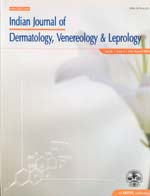
|
Indian Journal of Dermatology, Venereology and Leprology
Medknow Publications on behalf of The Indian Association of Dermatologists, Venereologists and Leprologists (IADVL)
ISSN: 0378-6323 EISSN: 0973-3922
Vol. 74, Num. 6, 2008, pp. 696-696
|
Indian Journal of Dermatology, Venereology and Leprology, Vol. 74, No. 6, November-December, 2008, pp. 696
Book Review
Handbook on health professional education - Shashidhar C. Mestri., B. Manjunatha
Thatte Urmila
India
Correspondence Address:India, urmilathatte@kem.edu
Code Number: dv08286
Jaypee Brothers Medical Publishers (P) Ltd., New Delhi
Pages 197; Rs. 150
This handbook, edited by Dr Mestri and Dr Manjunatha, has 18 chapters covering a wide spectrum of topics ranging from "Learning Aided by Visual Aids" to "Stress Management." Peppered by cartoons and illustrations as well as quotations, this handbook makes interesting reading for a beginner in the teaching profession. Apart from the editors, there are eight other experienced contributors. The chapters on visual aids, teaching-learning methods, and scientific presentation and publication are fairly comprehensive and would prove useful for a beginner. The book also introduces aspiring medical teachers to curriculum planning and evaluation basics. Most appropriately for postgraduates, the book has chapters on study designs, writing a research protocol, introduction to biostatistics, and introduces them to evidence-based medicine.
However, the chapter on biomedical research ethics leaves much to be desired. For example, the author writes, and I quote "The three fundamental principles of "Universal Ethics" are to be followed in research also. They are as follows: a) beneficence (do good) and b) nonmaleficence (do no harm)." Unquote The Belmont Report states the three basic principles of bioethics as justice, autonomy, and beneficence. Although justice and autonomy have been described later, the presentation is confusing to the uninitiated. Further, on page 141, the author has mentioned the guidelines for human experimentation where the year for the ICMR guidelines is given as 1980. In 1980 ICMR announced an ethics policy statement while the ICMR guidelines were published in 2000 and the current version is 2006 (please see http://icmr.nic.in/ethical_guidelines.pdf)!
The Ethics chapter is also incomplete, for example, in the statement for pediatric research, the author mentions that parental consent is required. However, as per current law (schedule Y) parental consent is not enough, ′assent′ is also needed from older children. On page 142, "No harm or risk to the participant" - is quite an inappropriate statement. There is invariably some risk (could be physical, psychological, social, or economic) in human experimentation and the basic principle is that the participant must be made aware of all the smallest risks involved and after understanding this he/she should consent to participate. Moreover, even the consent form that has been given as an example does not have space for the signature of the person administering the consent. I am sure that the contributors and editors will take care to correct these errors in the next edition.
Finally, the chapters on stress management and memory enhancement are useful in today′s day and age and would prove handy even for senior teachers! All in all, a handy book that postgraduates and aspiring medical teachers will find useful and offers value for money.[Figure - 1]
Copyright 2008 - Indian Journal of Dermatology, Venereology and Leprology
|
